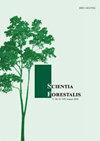Eucalyptus species extracts inhibiting in vitro growth of the phytobacterium Xanthomonas campestris pv. campestris
IF 0.4
4区 农林科学
Q4 FORESTRY
引用次数: 0
Abstract
inhibiting vitro of Abstract This study was carried out to evaluate the antibacterial potential of Eucalyptus spp. against two strains of the plant pathogenic bacterium Xanthomonas campestris pv. campestris ( Xcc ). The treatments consisted of aqueous and hydroethanolic extracts, at concentrations of 50% (experiment 1) and 35% and 15% (experiment 2), which were studied by the double layer inhibition test. The evaluated species were E. camaldulensis, E. cloeziana, E. grandis, E. “urograndis” and E. urophylla . Based on the results of experiment 1, it was observed that most of the extracts that inhibited the growth of the bacterial strains tested were hydroethanolic, except for the aqueous extract of the E. “urograndis” hybrid. Regarding experiment 2, it was observed that the greatest inhibition was with the concentrated extracts (35%), but the difference for the antibacterial effect was not significant in this case. Comparing the experiments, it was observed that in general the concentrated extracts (50%) had greater inhibition than the diluted ones. These results represent the potential of aromatic plants in the ecological management of Xcc , with emphasis on the aqueous and hydroethanolic extracts of E. cloeziana . Subsequently, bioassays will be performed to verify the effectiveness of such extracts in vivo .桉树提取物对油菜黄单胞菌体外生长的抑制作用。定
摘要本研究旨在研究桉树对两株植物病原菌油菜黄单胞菌的抑菌潜力。露营者(Xcc)。采用双层抑制试验研究了水提液和乙醇提液浓度分别为50%(实验1)、35%和15%(实验2)的抑菌效果。被评价的种有:山梨花田径鼠、cloeziana田径鼠、urograndis田径鼠和尾叶田径鼠。从实验1的结果可以看出,抑制所测菌株生长的提取物大部分为氢乙醇提取物,但乌桕的水提取物除外。在实验2中,我们观察到浓缩提取物的抑制作用最大(35%),但在这种情况下,抑菌效果差异不显著。实验结果表明,50%的浓缩提取物比稀释提取物具有更大的抑制作用。这些结果代表了芳香植物在Xcc生态管理中的潜力,重点是cloeziana的水提物和氢乙醇提取物。随后,将进行生物测定以验证这些提取物在体内的有效性。
本文章由计算机程序翻译,如有差异,请以英文原文为准。
求助全文
约1分钟内获得全文
求助全文
来源期刊

Scientia Forestalis
Agricultural and Biological Sciences-Forestry
CiteScore
1.00
自引率
0.00%
发文量
39
期刊介绍:
Scientia Forestalis is a scientific publication of the IPEF – Institute of Forest Research and Studies, founded in 1968, as a nonprofit institution, in agreement with the LCF – Department of Forest Sciences of the ESALQ – Luiz de Queiroz College of Agriculture of the USP – São Paulo University. Scientia Forestalis, affiliated to the ABEC – Brazilian Association of Scientific Publishers, publishes four issues per year of original papers related to the several fields of the Forest Sciences.
The Editorial Board is composed by the Editor, the Scientific Editors (evaluating the manuscript), and the Associated Editors (helping on the decision of acceptation or not of the manuscript, analyzed by the Peer-Reviewers.
 求助内容:
求助内容: 应助结果提醒方式:
应助结果提醒方式:


